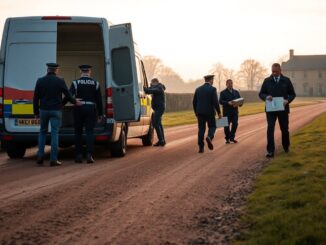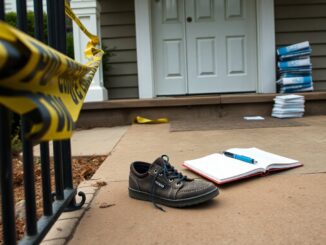A single punch led to a life lost, raising questions about violence in public transport.

In today’s world, the conversation around violence in public spaces is more urgent than ever. A recent tragic incident at Southwark Tube station serves as a stark reminder of how a fleeting moment can spiral into irreversible consequences. The death of Samuel Winter, a 28-year-old AI engineer and physiotherapist, following a violent encounter with 23-year-old Rakeem Miles, underscores the gravity of this issue.
But what does this incident really tell us about society’s relationship with aggression and its fallout?
Breaking Down the Incident
On the evening of August 22, 2022, Samuel Winter was simply heading home after a long day at work. Little did he know that a brief encounter with another commuter would lead to his tragic fate.
As he navigated the escalator at Southwark station, he accidentally brushed past Rakeem Miles. What happened next was shocking: an unprovoked attack that left Mr. Winter with a fatal head injury. This incident highlights just how rapidly a routine commute can escalate into violence, fueled by unchecked emotions.
After the attack, paramedics rushed to the scene, but sadly, Mr. Winter succumbed to his injuries just two days later in the hospital. The British Transport Police acted quickly, using Miles’ Oyster card to identify and apprehend him. Ultimately, he was convicted of manslaughter and sentenced to eight years, with the possibility of parole after just five and a half. This leniency raises important questions about whether justice truly reflects the severity of such acts.
What We Can Learn
This heartbreaking incident offers several key takeaways for individuals and society alike. First off, it’s essential to understand the importance of emotional regulation. How often do we let our tempers flare and react without thinking? This tragedy serves as a wake-up call about the dangers of allowing anger and aggression to take control, especially in public spaces where tensions can run high.
Furthermore, the case sheds light on the critical need for enhanced education around conflict resolution. Many people find themselves in heated moments but lack the skills to de-escalate conflicts effectively. By prioritizing communication and resolution skills, we can create a culture that reduces the likelihood of violence.
Lastly, this incident prompts us to think about public safety in our transportation systems. As cities grow and evolve, keeping public spaces safe and welcoming is more important than ever. Increased vigilance, community engagement, and support for mental health initiatives can help foster a culture rooted in safety and respect.
Community Takeaways
The loss of Samuel Winter is a painful reminder of life’s fragility and the destructive nature of violence. As a community, we need to come together to reflect on this incident and its wider implications. How can we cultivate a culture that values empathy and understanding? It’s crucial to address the underlying issues that contribute to violence.
In memory of individuals like Mr. Winter, we should advocate for improved training in conflict resolution and emotional intelligence—not just in schools, but across all sectors of society. By nurturing these skills, we can create safer environments and possibly prevent similar tragedies in the future.
In conclusion, the incident at Southwark Tube station serves as a profound lesson about the repercussions of violence and the urgent need for collective action to foster safety and respect in our communities. Only by tackling these issues head-on can we hope to prevent future tragedies and honor the memories of those lost to senseless aggression.




